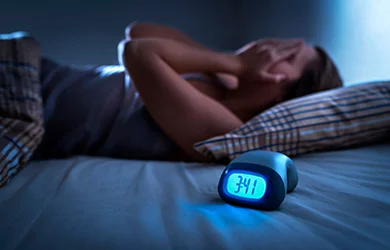How to fall asleep fast
Are you lying awake wondering when you will finally get to sleep?


Are you lying awake wondering when you will finally get to sleep?
Sitting at breakfast thinking about what went wrong after a tough night of tossing and turning?
You aren’t alone. Up to 60 million Americans struggle with sleeplessness. The sleep experts at Vicks ZzzQuil are here to help. Keep reading for “8 Tips to Fall Asleep Fast”. All the ideas may not be right for you, but one or two may make a difference on how quickly you get to sleep tonight.
Sitting at breakfast thinking about what went wrong after a tough night of tossing and turning?
You aren’t alone. Up to 60 million Americans struggle with sleeplessness. The sleep experts at Vicks ZzzQuil are here to help. Keep reading for “8 Tips to Fall Asleep Fast”. All the ideas may not be right for you, but one or two may make a difference on how quickly you get to sleep tonight.
8 Tips to Fall Asleep Fast
“Sleep hygiene really is practicing the art of healthy sleep.”
When searching for sleep “tips and tricks” you may have come across the term “sleep hygiene” and wondered “what does cleaning have to do with sleep?” While hygiene is often linked with cleanliness; the word originated in Greece and means “the art of health”. So, sleep hygiene really is practicing the art of healthy sleep. Just like there are different types of art, there are different approaches to improving your sleep. These tips are the result of expert study and backed by the experience of people like you who have improved their ability to fall asleep and fall asleep fast. One of these eight tips may just be what you need to practice the art of healthy sleep.
1. Get on a schedule.
Catching up on sleep over the weekend may feel great on Saturday or Sunday, but sleeping in can feel terrible on Monday morning. Rather than trying to catch some extra Zzzs over the weekend, try going to bed at the same time each night and waking up at around the same time each morning. If possible, go to bed a bit earlier on weekdays, so you don’t feel like you’re running behind on sleep. Studies have shown that staying on a schedule can be a big help for performance during the day. Also, if you’re a napper, limit your naps to one 30-minute nap a day; a nap any longer will cause you trouble falling asleep later that night.
2. Exercise regularly.
Everyone knows exercise has a lot of benefits for your body, but did you know that sleep is one of them? While it might seem a little contradictory that being active helps you rest, the physicians at Johns Hopkins University strongly recommend it for sleep. One watchout, don’t do any strenuous exercises before bed, as this will increase your energy, making it more difficult to fall asleep afterward. Save your intense workouts for the morning.
3. Get some natural sunlight.
Natural sunlight lets your body know that it’s time to be awake. If you find yourself indoors all day or not getting any natural sunlight, you could be causing your body’s circadian rhythm to get confused. It’s important to get at least some exposure to natural light each day. In a small study of seniors, just two hours of sunlight in the morning for 5 days in a row made significantly improved sleep quality.
4. Make your room dark and put the screens away.
Doctors at the University of Michigan recommend getting your bedroom ready for sleep. That means getting some darkness. Makes sense, right? We evolved over thousands of years to be used to total darkness. If you’re reading this in bed on a bright phone, tablet or computer, you could be wreaking havoc on your circadian rhythm. Bright screens trick your brain into thinking it’s still daytime and your body doesn’t create sleep inducing substances that your brain needs to “turn off”. While there are apps that change the light on your phone or computer to a more soothing yellow, the best thing you can do for your sleep hygiene is to put your screens away at least an hour before bedtime. And, if you have a TV in your bedroom, move it to the living room.
5. Turn the clock away.
It’s great to know what time it is… except when you are trying to go to sleep. Doctors at the University of Pennsylvania conducted experiments and proved that clock watch leads to poorer sleep. Looking at a clock tick later and later into the night when you know you need a good night’s sleep is stressful. And, stress makes it harder to get to sleep. Position your clock in a way that doesn’t allow you to see it while you’re trying to sleep.
6. Keep your room cool and comfortable.
When it comes to sleeping, cooler is better. Sleep experts at Cleveland Clinic recommend your bedroom should be cool, between 16-20 degrees Celsius. Your body naturally cools as you sleep, so cooling down your body signals to your brain that it’s time for bed.
7. Practice mindfulness.
If it’s a restless mind that’s keeping you awake, practice stress-relieving mindfulness exercises. In a study among college students, researchers found that regular practice of mindfulness improved sleep quality over the course of a semester. Meditation, yoga and journaling are all excellent ways to help release stress, so that your mind doesn’t race while you’re trying to fall asleep.


![[en-ca] What is Melatonin? | ZzzQuil](http://images.ctfassets.net/klfgau6xxt2r/4DYuy8QxYvO6ZOWAZrVWKi/2681c98338d4f53dced83867808796e7/Desktop_Banner_0022_shutterstock_1536338213.jpg)
![[en-ca]15 simple tips to fall asleep faster and wake up refreshed](http://images.ctfassets.net/klfgau6xxt2r/3uQOkqd0kU19CdJ4jNhM8Q/7261dade21d3af815ecb2e08f1dc1a3d/Desktop_Banner_0004_shutterstock_566717836.jpg)
![[en-ca] Ashwagandha Benefits for Sleep and Stress | ZzzQuil](http://images.ctfassets.net/klfgau6xxt2r/4XfklMWffpvxJQcSu5x1Ld/e599af528564ec713b5f21d62b79bb7c/Desktop_Banner_0025_shutterstock_1468998338.jpg)